When you first start making your own products, you intend for customers to buy them, enjoy them — and come back for more! The latter is especially important, because a return customer is less work for you than looking for a new one.
But what if someone was given your product as a gift or the person who bought it can’t remember who they got it from? If you don’t use good branding on your products, you might miss out on future sales. So be sure to use branded products to increase your sales and make a name for yourself by growing your fanbase.
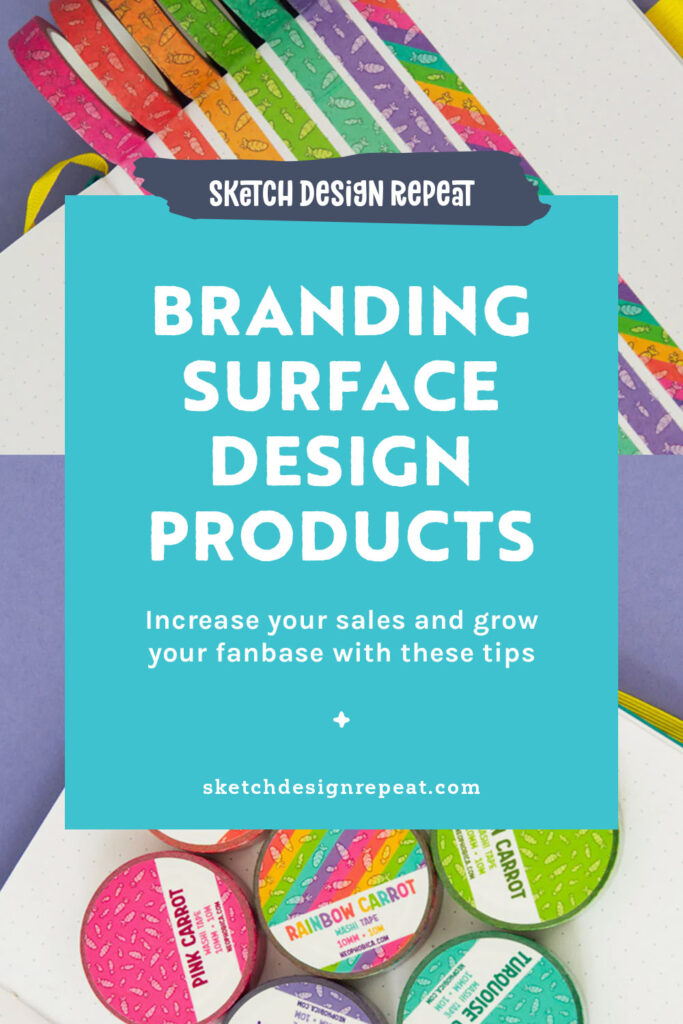
Product Branding Options
Product Branding means that your logo or brand name are on the item itself or attached to it directly. This ensures that anyone who looks at the item knows where it’s from. This is the best and most desirable way for any of your products, as the customer has an instant connection with your brand. Here are some options to choose from:
Labels and Tags
Labels can be woven or printed and are made for items made of fabric (like pencil cases, apparel, dish cloths and tote bags). You can either use a sew-on or sew-in label or attach one as a zipper pull. The better the label is attached to the product itself, the less likely it’s going to be lost or removed by the customer.

Tags are usually made from paper, cardstock, or plastic and are attached to the product via a string. You can add much more information to a tag compared to a label (you can print it double sided or even have a mini flyer customers can open up). The downside of tags is that the client will take them off before use, so it’s not a permanent solution.
Signatures
This is a great option if you sell originals and prints like illustrations or paintings. It also shows the authenticity of your work. If you are not a fan of having your signature in the front, you might want to consider putting it on the back or using a custom origin sticker. This way you can add even more details, such as the print run, materials used, date of completion, and your website. Just make sure that the paper you are using for your artwork is thick enough, so the sticker doesn’t shine through to the front of your artwork.
Print-On
Printing your branding onto a product is one of the most permanent options you can choose, but it might not suit every product. It works really well on postcards, greeting cards, books, notebooks, notepads, mugs, and even fabric items like bags. Just make sure the placement doesn’t take away from the artwork itself, as this might deter customers from buying your products.

Embroidery
This is a similar solution to print-on, but it’s only used for products made of fabric, like hats, backpacks, scarves, beanies, and aprons. Otherwise, the same rules apply as for print-on.
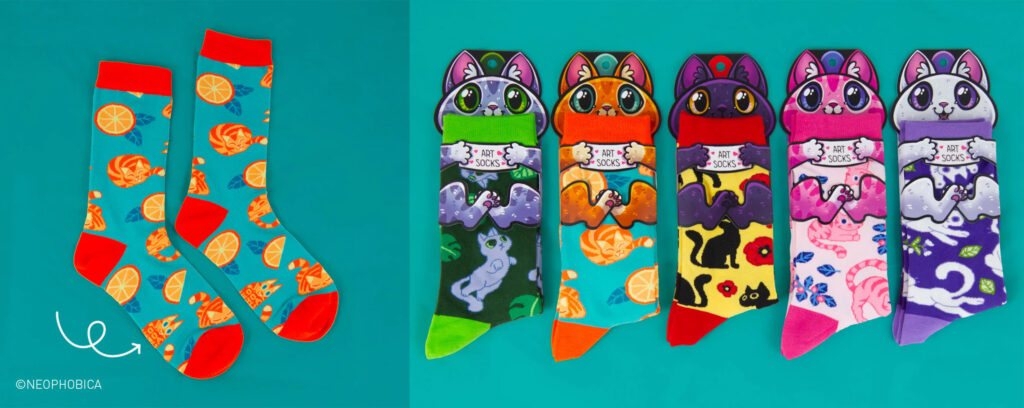
Embossing/Engraving
Embossing can be used on paper and fabric products. It might be less visible than print-on branding, but it also adds a sense of luxury, which makes it well suited for original artwork, prints, limited editions, and high-end products. If you make anything that’s not flat, but three dimensional, engraving your branding onto the object works extremely well — no matter if it’s ceramics, wood, stone, or plastic.
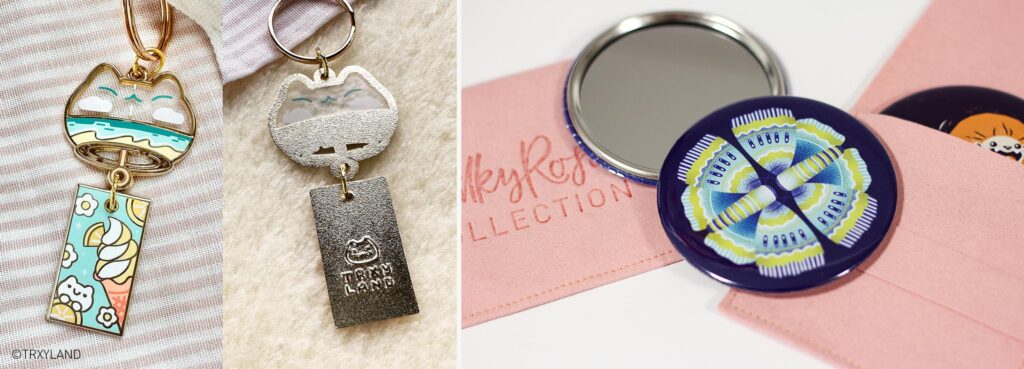
Related Article: Personal Branding Photography for Creatives
Product-Related Branding Options
When thinking about branding for your products, you might want to consider anything that’s close to your products as well, such as packaging. The more you add your brand personality to all sorts of elements, the better your customers will remember you and form a strong bond with your brand.

Protective Covers
Some items are ok being touched. Others can be wrecked with dirty hands in an instant. Protective covers are mostly used when selling your products in person at markets and shows, or when you ship them, and need to protect them from external elements like light or water. Plastic sleeves are perfect to keep your goods clean and dry. It also adds the possibility of adding a sticker with more information or some brand personality.
If you produce high-end products, you might want to choose an alternative to plastic sleeves to increase your customer’s perception of quality. Many luxury brands put their items into fabric pouches, boxes, or containers with printed on or embossed branding (e.g. pocket mirrors, jewelry, and candles).
Backing Card
Backing cards are great for small or delicate items where you can’t add any branding (like jewelry, pins, or keychains). You can even create a fun design that draws customers in and communicates your brand personality.
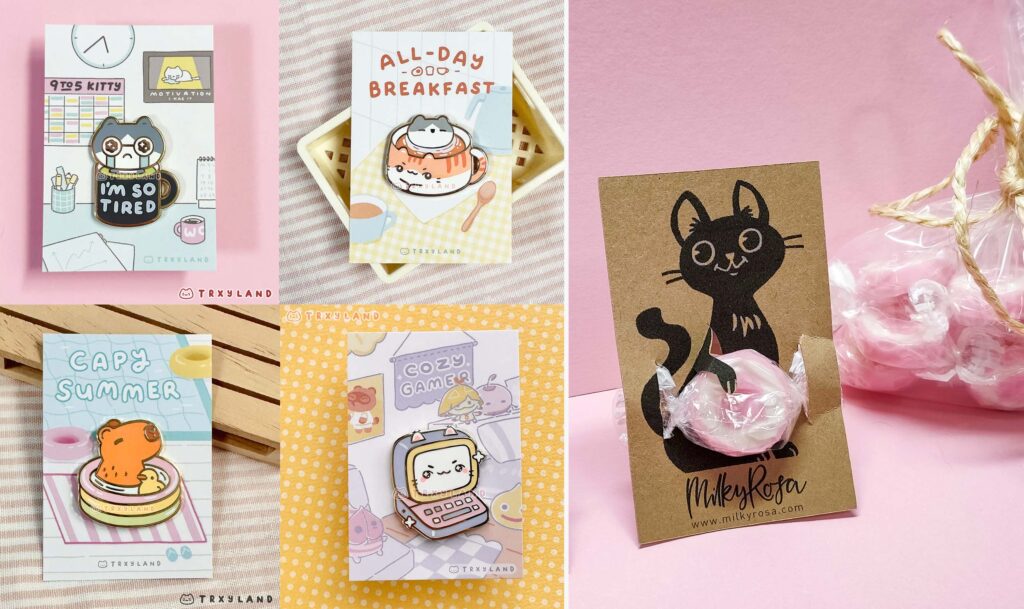
Shipping Boxes/Envelopes
Shipping boxes and envelopes are a great opportunity for a stunning first impression. They can be designed in a way that stuns your clients from the get-go!
Naming your Products
This is something not many people consider when creating their products. But I’ve experienced myself how powerful this can be, if done right. My latest product idea is a pencil case, shaped as a cat with two compartments. I decided to use one zipper and one drawstring closure (you might already guess how the latter one looks). So I leaned into the humor of it and called my new product “The Asshole Cat.”
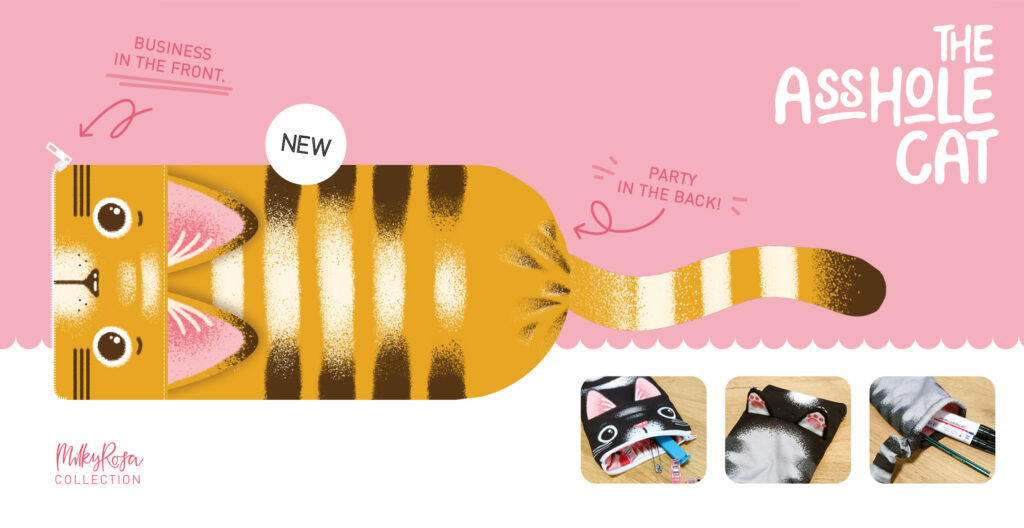
It’s a great conversation starter at markets and my target audience loves the fun name! This might not work for every product you launch, but if the opportunity arises — make sure to make the most of it!
Did you consider branding your products before? These tips give you a great starting point for your branding journey ahead. And remember — no one starts with all the bells and whistles. You might have an end goal in mind, but you can start small. Consider DIY options over pricy manufactured ones at first and build up and enhance your branding as you go.

Written by Nina Schindlinger
Website: www.milkyrosa.com
Instagram: @milkyrosadesignagency
Class: Create Your First Product
Nina is the founder and creative director of MilkyRosa Design Agency. She specialises in branding and product design for companies that are young at heart. Her design style is bold, playful and charming, which she uses for her own line of products to make the world a fun and colourful place.